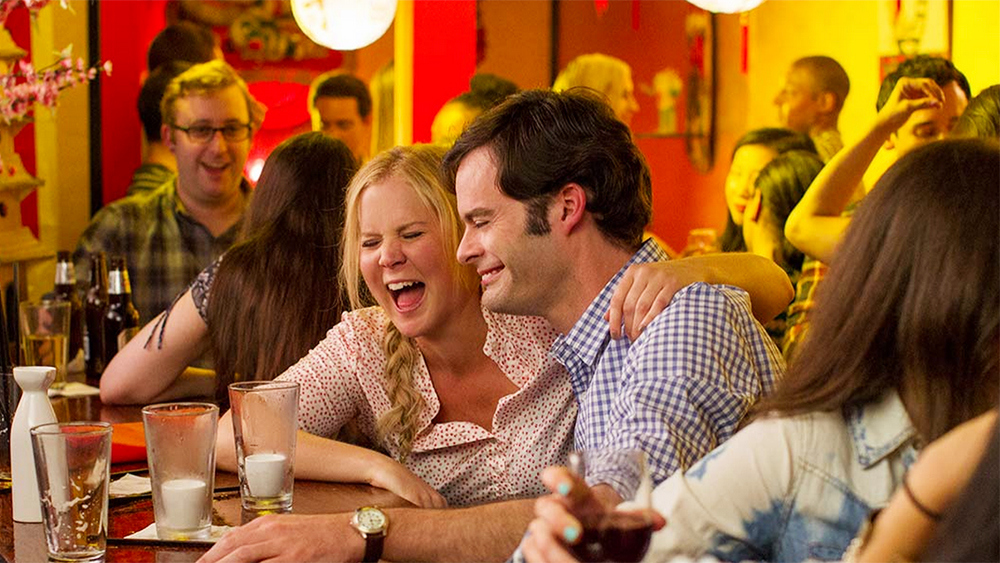Review: Does Trainwreck Live Up to Its Own Feminist Standards?

It says a lot about the state of women and other marginalized groups in film that Trainwreck is being marketed (and praised) as “not your mother’s romantic comedy.” In many ways Trainwreck is wholly different from most mainstream romantic movies, but that’s not to say it’s as surprising, funny, or even as feminist as I’d hoped it would be. (Daniel Radcliffe’s cameo, though. That is worth the price of admission alone.)
In case you’ve somehow missed Trainwreck‘s omnipresent advertising (I’m not complaining; I think it’s incredible that a female-led comedy had so much power behind it), Amy Schumer stars as Amy, a single twenty-or-thirty-something woman who enjoys drinking, smoking, and having lots of sex with various different partners when she’s not writing for a swanky magazine or caring for her ailing Dad.
I think my first disconnect with the movie came from trying to reconcile my initial impressions of Amy with the movie’s determination to label her as a trainwreck. Amy seems to enjoy her job! She’s invested in the health of her family and devotes her spare time to hanging out in an assisted living place with her father! When not dealing with her other responsibilities, she seems extremely fulfilled by her open relationships with various partners; which is not only her right as an adult, but also an accurate representation of many women’s ideal romantic set-up!
In other words, this is a woman who seems to have her shit relatively together; so it bothered me that the movie seemed determined to condemn her lifestyle and compare Amy to her wedded and pregnant younger sister (Brie Larson). Trainwreck occasionally suffered from Jurassic World-syndrome in its eagerness to condemn women for not measuring up to traditional notions of femininity (aka, babies). Eventually, Trainwreck defaults to saying Amy’s main problem is that she’s “mean,” but that feels like a cop-out: Amy’s not mean, she just has different priorities than her sister, her sorta-boyfriend, and society expect her to.
Thankfully, Schumer’s acting rescues Trainwreck from its Jurassic World-level preoccupation with motherhood and family. Schumer is a controversial figure as a comedian and a feminist, but she imbues Amy with enough agency that I was able to believe her character’s decision to GET SERIOUS ABOUT LIFE (aka get a boyfriend and throw out her bongs?) was her choice as an individual, and not just the result of societal pressures.
Honestly, I wish more of the movie had just relied on Amy Schumer and Bill Hader’s chemistry. They’re so damn likable together, and so funny without doing anything, that it distracts from and grounds Trainwreck‘s messy, overstuffed script.
If I were to try and chart Amy’s growth from the beginning of the movie to the end, I’m not sure I’d like what I saw from a feminist standpoint. At the same time, Trainwreck didn’t actively offend me while I watched it, which, sad to say, is kind of remarkable. (A lot of important things have also been said, and far more eloquently than I could say them, about the politics of Trainwreck having a romantic female lead who doesn’t totally conform to traditional Hollywood beauty standards. )
Ultimately, Trainwreck’s faults as a movie are overlookable, and its faults as a piece of (mostly self-proclaimed) feminist media are more the result of the burden of representation than anything else. If more movies of any kind (not just rom coms) cared as earnestly about presenting the female viewpoint as this movie does, than the aspects of Trainwreck that felt to me like failures would have probably been unnoticeable.
Dat Radcliffe, tho. Hoo boy. I cannot wait till you weirdos see that.
—Please make note of The Mary Sue’s general comment policy.—
Do you follow The Mary Sue on Twitter, Facebook, Tumblr, Pinterest, & Google +?
Have a tip we should know? [email protected]